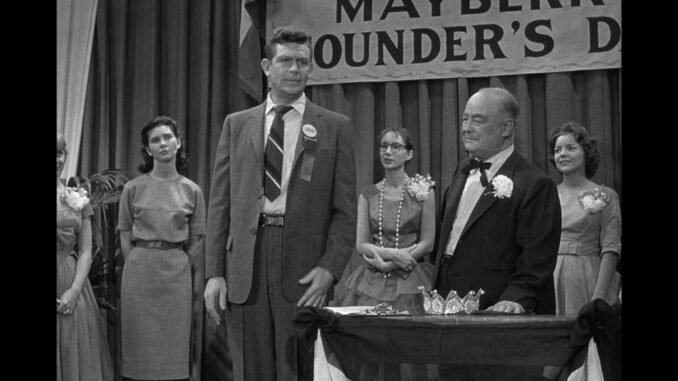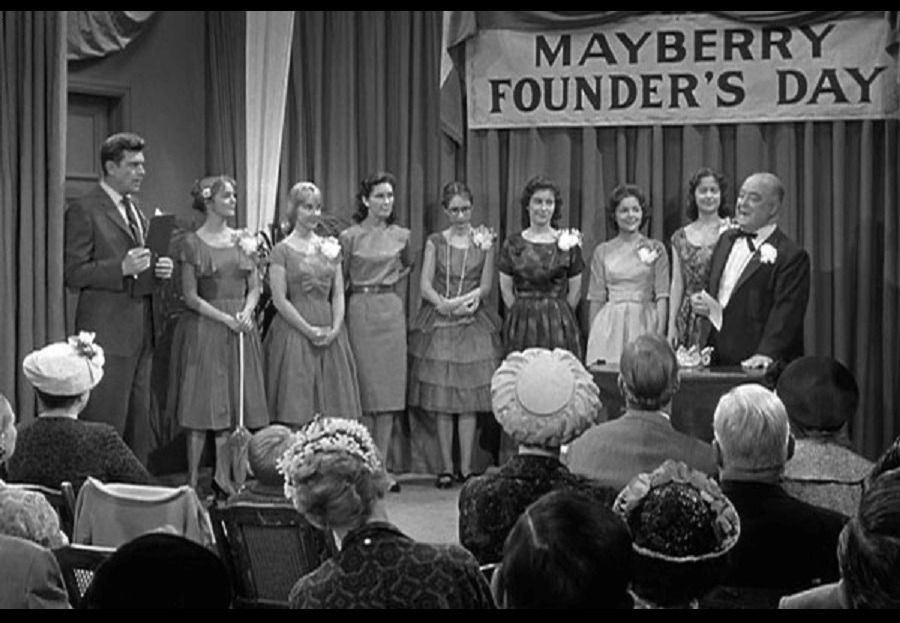
Introduction: Why “The Beauty Contest” Still Resonates
Let’s be honest—The Andy Griffith Show wasn’t just another sitcom. It was a wholesome slice of Americana. Season 1, Episode 16, titled “The Beauty Contest,” is one of those quiet gems that sneaks up on you with its charm, humor, and subtle message about fairness, bias, and what real beauty looks like.
But what made this episode stand out? Why do fans still remember it decades later? Let’s dig deep into the storyline, character dynamics, and timeless lessons hidden in the heart of Mayberry.
The Premise of “The Beauty Contest”
At its core, this episode is about Andy Taylor being roped into judging Mayberry’s annual beauty pageant. What seems like a harmless civic duty quickly spirals into a comedic (and slightly uncomfortable) situation when Andy’s personal feelings come into play.
Meet the Contestants: A Town of Charm and Personality
The young women of Mayberry each bring something different to the stage—sass, sweetness, elegance, and charm. It’s not about glamor here; it’s about personality. And that’s where Andy gets tangled up.
Ellie Walker Steps In: The Feminist Hero Mayberry Didn’t Expect
Ellie, the town pharmacist and Andy’s love interest, calls out the entire concept of the pageant. She argues that women shouldn’t be judged solely on looks. At a time when most shows wouldn’t touch this subject, The Andy Griffith Show quietly lets Ellie plant a feminist flag in small-town soil.
Andy’s Dilemma: When Objectivity Meets Personal Bias
Andy wants to be fair. But when people close to him—especially Ellie—expect certain outcomes, his role as a judge suddenly feels more like a tightrope walk. The episode cleverly explores how personal relationships can cloud professional judgment, even in something as seemingly innocent as a beauty contest.
Barney Fife: The Unintentional Comic Relief
Of course, you can’t have an episode without Barney Fife’s wild antics. He campaigns hard for a contestant he fancies, bringing the usual dose of awkward charm. His meddling creates some of the episode’s funniest moments.
Small Town, Big Expectations
In Mayberry, everyone knows everyone—and that’s both a blessing and a curse. When the townsfolk start lobbying for their favorite contestants, it becomes a social minefield for Andy. The episode nails the pressure of living in a place where everyone expects you to play favorites… even when you don’t want to.
The Final Twist: Choosing Inner Beauty Over Outer Expectations
At the end, Andy shocks the town by choosing someone unexpected—not the prettiest, not the most popular, but the most genuine. This twist gives the episode its moral backbone and proves that even in 1960s TV, there was room for deeper meaning.

Behind the Scenes: Real-Life Lessons from the Cast
Off-screen, this episode mirrored real-life conversations among the cast and crew. There was concern about how women were portrayed on the show, and this episode was a quiet push to shift perspectives. Andy Griffith himself wanted to keep the series grounded in values.
Moral of the Story: Beauty Isn’t Just Skin Deep
It’s easy to write off a beauty contest episode as fluff, but “The Beauty Contest” subtly delivers a message: Don’t judge a book by its cover. In a world that often puts appearance first, Andy’s choice reminds us all to look a little deeper.
Character Development: Andy as a Complex Lead
This episode adds layers to Andy Taylor. He’s not just the affable sheriff; he’s a man struggling with pressure, expectations, and morality. His decision at the end shows growth and wisdom, which helped cement Andy as one of TV’s most relatable father figures.
Ellie’s Role in Shaping Andy’s Values
Ellie doesn’t just challenge Andy—she shapes him. Her perspective gives him pause and pushes him to think beyond tradition. In many ways, she’s the moral compass of this episode.
Why the Episode Still Matters Today
With modern debates over beauty standards and inclusion, “The Beauty Contest” feels surprisingly relevant. It might be set in a sleepy town, but its themes echo in boardrooms, classrooms, and even social media feeds today.
Legacy of the Episode: Quiet but Powerful
While it’s not the most action-packed or famous episode, fans often mention “The Beauty Contest” as a turning point. It marked the show’s willingness to tackle deeper issues under the surface of comedy.
Hidden Symbolism in the Episode
Pay attention to the stage setup, the costumes, and even the dialogue. Much of it subtly critiques the superficial nature of pageantry while celebrating authenticity.
Audience Reception: Then vs. Now
In the ‘60s, viewers loved the humor and hometown feel. Today, younger audiences who stumble upon reruns often notice the episode’s forward-thinking ideas about gender roles and community fairness.
Final Thoughts: Mayberry’s Quiet Wisdom Still Shines
“The Beauty Contest” may not be flashy, but it’s thoughtful, funny, and surprisingly modern in its messaging. It teaches us that even in the gentlest of settings, big ideas can bloom.
Conclusion: Lessons Wrapped in Laughter
When we think about The Andy Griffith Show, we often remember the laughs, the banter, the whistling intro. But every now and then, an episode like “The Beauty Contest” sneaks in a life lesson. Andy’s decision to choose authenticity over popularity reminds us that beauty really is in the eye of the beholder—and sometimes, that eye needs a little clarity.
FAQs
1. What year did “The Beauty Contest” episode air?
The episode originally aired on January 23, 1961, during the first season of The Andy Griffith Show.
2. Who won the beauty contest in the episode?
Andy surprised everyone by choosing Miss Rosemary, a humble and sincere contestant, showing that personality mattered more than glamor.
3. Was Ellie upset about the beauty contest?
Yes, Ellie challenged the idea of judging women based on appearance and gave Andy food for thought, ultimately influencing his decision.
4. Did Barney Fife have a major role in this episode?
Yes, Barney added comic relief by pushing his preferred contestant, which only added more tension and humor to Andy’s judging role.
5. Why is this episode still relevant today?
It addresses themes like gender roles, fairness, and authenticity, all of which continue to be hot topics in today’s society—making it timeless television.